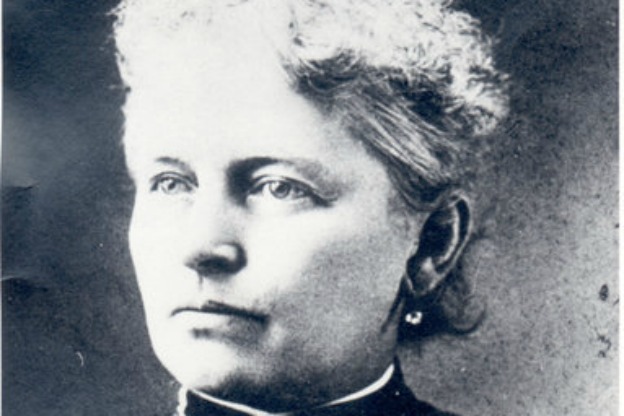The Suffragette Onstage
One of the great traditional goals of theater was to serve as an opportunity for a community to present itself onstage. The Little Theater Movement in America, directly inspired by nationalist Irish plays, often did this, telling tales of local history, local tall tales, and staging local color.
For whatever reason, Omaha doesn’t seem to have done much of this. Our early stock companies tended to do local version of whatever everybody else had done years earlier, which is mostly the case today. I can’t help but wonder if it wasn’t because, when locals attempted to use the stage to address local subjects, it looked like what Mrs. Gougar offered in May of 1890. It was just one woman, all she did was talk, and she castigated Omaha.
This is not a blog about the closely linked suffragette or temperance movements in Omaha, but, my goodness, somebody should start such a blog, because Omaha’s early politically active women are worth looking into. Did you know they took over a space on 15th and Capitol and started their own restaurant, using the proceeds to underwrite their activism? Did you know it was so popular that the women running the restaurant gave up on using it as a mechanism of charity and simply broke off to form a series of successful local restaurants?
And I don’t have time to truly detail the works of Mrs. Helen Gougar, who was based in Indiana but was a frequent a visitor to Omaha, and locals frequently booked local theaters for her to speak upon. Gougar was nationally visible for her activism, which included suing her home state for the right to vote, and her involvement with the temperance movement led to her having an active role in party politics.
Gougar was booked into the People’s Theater on 1309 Douglas Street, a vaudeville house, but her subject was decidedly not vaudevillians: “Relation of the Wage-Earner to the Saloon.” Gougar’s speech proved popular, though, the World-Herald reports that the theater was filled.
I find the substance of her speech to be terrifically interesting, as she takes issue with something called the “high license.” When Gougar was active, there was a sort of general recognition that saloons were a problem, as they were publicly connected with lawlessness, domestic abuse, and alcoholism. The high license was an attempt many cities made to address this, by making the cost of having a saloon license high enough that it would reduce the number of saloons and bring up the general quality.
Omaha did this, and, as Gougar points out, it didn’t really work. There were still plenty of saloons -- contemporary estimates put it at 219 saloons, or one for every 468 inhabitants, which may not have been an enormous number of saloons, but for a city the size of Omaha, it was plenty. These businesses essentially paid a sin tax of $1000 per year to the city to keep operating, and Gougar took issue with this. Her argument: “because an extra tax of $1000 was put on their business saloon men were forced to add new attractions to these resorts and so debauch the greater number of men.” She had a point -- newspapers of the era mention frequent raids on Omaha bars for gambling and other vice. It was not uncommon for local saloons to function as a sort of a cabaret, with dancing and singing girls, and it was also not uncommon for these performers to be prostitutes, and for there to be a brothel above the bar. And while prostitution was tolerated in Omaha, there are frequent tales of drunken men having a “high time” with these women only to wake up with their pockets empty.
“Whale element in Omaha controls your city politically?” Gougar asked. “You are forced to answer the saloons, the fiends, the deadbeats, the people who were not wanted in the old country and come here to sap the life of your country. The time has come when you men must be patriotic and destroy the saloons or they will destroy the American Republic.” Gougar pointed out the anarchist riots in Chicago, and claimed they were the result of saloons.
Gougar made the relationship between the saloons and prostitution explicit. “You have more prostitution in the city, according to its size than exists in any city on this earth,” she castigated the audience. “You have more arrests here last year according to the population than any city in the world. Yesterday I found out how you derived revenue in this city by the prostitution of your girls ... Can you realize that this city is so corrupt that no attempt is made to weed out these rapidly increasing houses of vice. I want you to stop worrying over a lot of debased saloon keepers and work for the fallen women.”
“I asked one of your officers, ‘Do you never arrest the men who frequent these places,’” she continued. “‘No,’ said he, ‘not unless they commit some additional crime.’”
Gougar was right. Although prostitutes were arrested, it was almost always for petty larceny; we only know they were prostitutes because their arrest records list that as their profession, not their crime.
Was anything done about it? Mrs. Gougar was speaking in 1890, and in the 1930s there were still the sorts of saloon/brothels she complained about, and the last of them, the notorious Bell Hotel downtown, managed to hang on until 1953.
Maybe the full house in Omaha that October came because they agreed with Mrs. Gougar. If so, they were unable to do anything about it.
I have a different theory, though. I think a lot of people in the audience went because they wanted to hear about Omaha from the stage. And more than anything, they wanted to hear how naughty we were.
It may not have been effective politics, but it sure was good theater.
